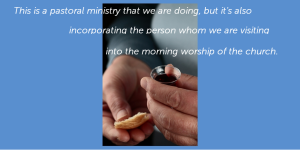Jesus specifically refers to pastoral care for the sick or infirm as a blessed activity, saying “Come, you that are blessed by my Father…for I was sick, and you visited me” (Matthew 25: 34,36). The ministry of Eucharistic visitation is doubly sacred, since the Eucharistic visit has both a pastoral and a liturgical purpose. The pastoral purpose, bringing community to people who for some reason cannot join church services, extends the church’s love and compassion to the care recipients and helps these people receive the care that they need. The liturgical purpose, bringing the Eucharist to these fellow Christians who are facing trouble, incorporates them into the liturgy as part of the congregation and allows them to worship as part of the community of the faithful. If you are considering engaging this ministry, or if you already do so, consider taking our new class, Eucharistic Ministry with Tim Spannaus.
In this class, Tim Spannaus offers guidance on how to make Eucharistic visits as effective and useful to their recipients as possible. He discusses the meaning of the Eucharistic visit; its function  in embracing the home- or hospital-bound recipients as participants in the congregation. He offers practical advice about what to bring to the visit, how to use the communion kit, how to report the recipient’s needs to the parish effectively, etc. He also offers valuable advice about the spiritual preparation involved in making an effective Eucharistic visit and about the approach one should take in discerning and responding to the true, deep needs of the care recipient.
in embracing the home- or hospital-bound recipients as participants in the congregation. He offers practical advice about what to bring to the visit, how to use the communion kit, how to report the recipient’s needs to the parish effectively, etc. He also offers valuable advice about the spiritual preparation involved in making an effective Eucharistic visit and about the approach one should take in discerning and responding to the true, deep needs of the care recipient.
If you help to train Eucharistic visitors in your parish, or if the Eucharistic visitors in your parish would like to learn and discuss this ministry in groups, please consider using the class Eucharistic Ministry for Groups, which offers Tim’s lectures and prompts discussion in a format designed specifically for group learning.
To get a better sense of what this class offers, please enjoy this video:
Tim Spannaus is a deacon and lector at St. John’s Episcopal Church in Royal Oak, Michigan. He teaches on liturgy at The Whitaker Institute in Detroit, Michigan.

